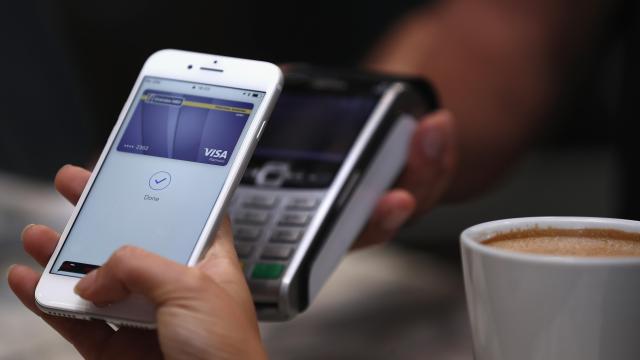Apple has long treated its own tap-and-go Apple Pay platform like a prized fruit tree in a verdant garden, where only they could dictate who gets to nibble on its succulent delights. Now a new suit from an experienced anti-big tech firm is looking to take a rather ravenous bite out of Apple over its miserly attitude regarding people paying when using its mobile devices.
A new class action suit accuses Apple of being anticompetitive by forcing Apple Pay down users’ throats on iPhones and Apple Watches, all the while allegedly extracting “$US1 ($1.45) billion” in fees earned from card issuers. The antitrust lawsuit claims those funds were as of 2019, and that the revenue is expected to “quadruple” by next year.
The document further alleges that issuers aren’t allowed to charge additional fees for Apple Pay transactions, which means the additional fees are eaten by the issuers. The suit says it looks to reimburse card issuers for paying Apple’s fees, and also put an end to Apple’s restrictive policies.
The suit was filed in Northern California district court Monday on behalf of Iowa-based Affinity Credit Union, which claimed it is required to pay Apple’s “supracompetitive” issuer transaction fees on Apple Pay transactions through their own payment cards. Apple allegedly charges for credit transactions (15 points or .15%) and debit transactions (.5 cents ($0.07)) despite essentially providing the same service for both. On the other hand, Android tap and pay services charge no fees to card issuers.
In a release issued by the firm Hagens Berman — one of the firms representing Affinity — Managing Partner Steve Berman said that while Apple Pay is “essentially identical” to Google Pay and Samsung Pay (now Samsung Wallet), “the same service on Android that card issuers pay absolutely nothing for costs them a collective $US1 ($1.45) billion annually through Apple Pay.” This is compared to Android devices, where there are multiple apps that offer contactless payments.
Apple did not immediately respond to Gizmodo’s request for comment.
This isn’t the first time somebody’s made noise about Apple’s restrictive pay policies. European Union officials have also complained about Apple’s restrictive use of its near-field communication, or NFC technology. Apple has claimed it restricts access to its NFC chip for payments due to security reasons. It compares itself to Google by presenting Android’s software as “less secure” than its own integration between its iOS and proprietary hardware. Of course, Google denied that its systems are any less secure than its competitors.
In addition, the tech giant is still reeling from the fallout from Epic Games’ lawsuit against Apple’s so-called “walled gardens” on its app store. A judge ruled last year that the company must allow for competing payment platforms to exist on Apple devices. Apple then tried to stall the policy change, but a judge forced the company to figure out how it would make its app store more open for competing payment methods.
The new antitrust suit further states that mobile wallet transactions have drastically increased since 2015 to more than $US1.2 trillion in the U.S., and Apple Pay accounted for 92% of those mobile wallet debit transactions in 2020.
Attorneys are also touting their own success against big tech, obviously trying to sign on more people to the class action. The same firm was involved in a suit over alleged ebook price fixing and another class action suit against Apple where app developers alleged the company was restricting payment options for apps.
